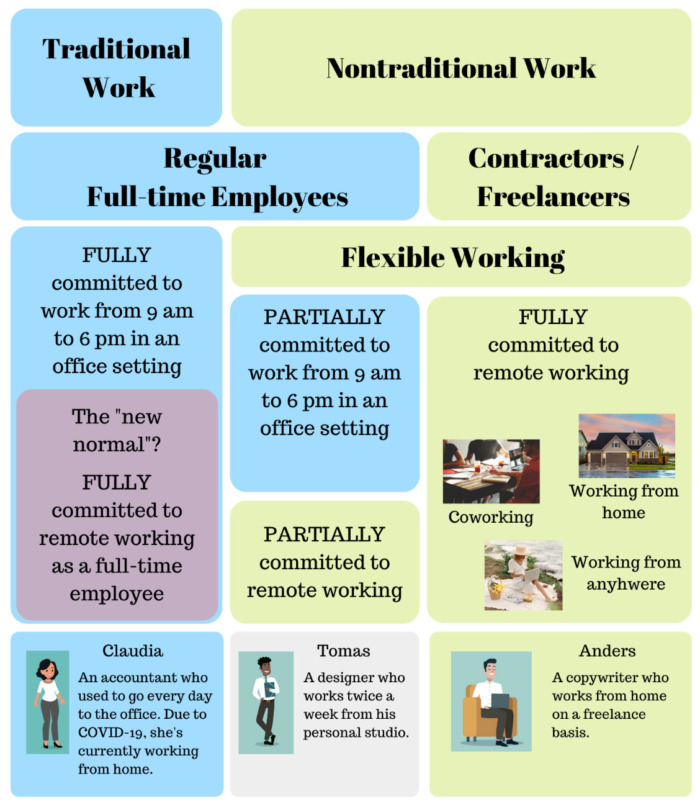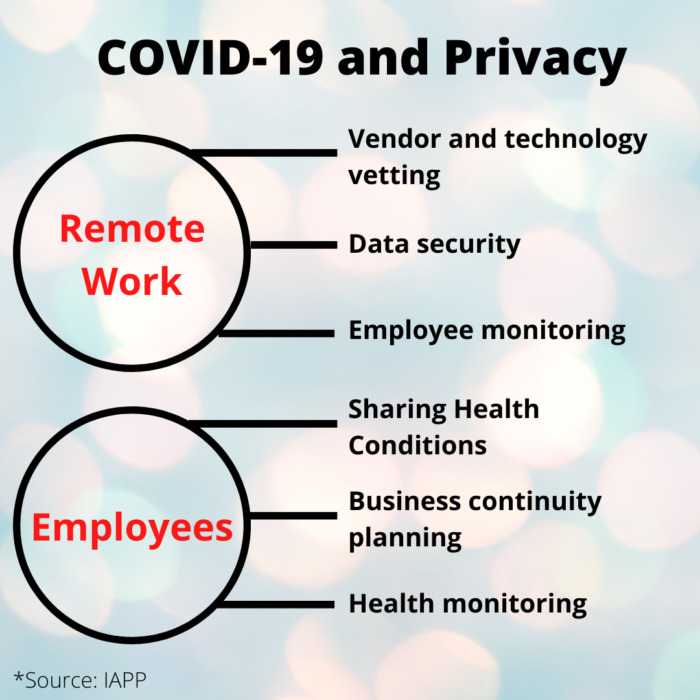The boom of remote working: A review of the trends and legal issues for companies


Table of Contents
Table of Contents
In the last decade, remote working has been on the rise. Whether partially or on a full-time basis, the number of contractors and employees working from home or elsewhere has exploded. Such a trend has been further accelerated by the coronavirus pandemic, as many full-time employees who previously worked in an office have now been asked to work remotely from home. In spite of this, the legal framework surrounding remote work (particularly for nontraditional professionals) is still incipient, even if companies are saving costs and professionals are achieving a better work-life balance.
Companies are “seeking to minimize the number of workers who must be treated fairly,” argues an article by the Editorial Board of the New York Times. Employers like to hire contractors because they are cheaper compared to the cost of employees, but also because they don’t need to cover the legal protections and benefits of regular employees.
This corporate attitude towards nontraditional work has affected the legal standards that regulate remote working. According to the 2018 Future Workforce Report by Upwork, a global freelancing website, in the United States “nearly two-thirds (63%) of companies today have remote workers, yet a majority lack remote work policies.”
There is a significant mismatch between the explosion of nontraditional work and the legal framework that should protect the rights of those working remotely. Let’s take a look at the trends and legal issues affecting professionals and employees working from home.
It’s important to note that the ability to work from home is just one aspect of a bigger universe: flexible working. Flexible working includes any working arrangement that doesn’t fit within the traditional 9-to-5 job in an office.
When it comes to location, there is a significant number of professionals who use different kinds of solutions. The Global Workspace Survey produced by IWG, a Swiss provider of serviced offices and coworking spaces, highlights this clearly. “Many types of workers are using various combinations of workplace solutions that include home working, business lounges, and remote offices, as well as traditional office locations, rather than espousing a single solution.”
Similarly, research carried out by remoters.net found that “not all of the remote working professionals really want to be just traveling all the time, or working from home or a specific location, but need and want flexibility.”

Working from home is a trend that continues to rise. According to Fundera, in 2017 there were roughly 3.7 million employees worldwide working from home at least half the time.
What’s more, remote working has become a favorite perk for both employees and companies. A recent infographic published by the digital company GO-Gulf, as well as data from the Global Workspace Survey, highlights that:
Today, more and more professionals are openly embracing remote working. Both employees and employers expect a future where remote working will be the new normal.
“The idea of commuting for hours to work 9-5 in a dreary office is fast becoming about as relevant as a fax machine in the working day.”
Global Workspace Survey
Considering the above, is remote working the best thing since sliced bread? Companies are certainly saving money and increasing productivity while employees are enjoying the benefits of working from home. However, there are two important issues to consider. First, working from home can have a negative psychological impact on some people, especially those who made the change suddenly as a result of the COVID-19 pandemic. Second, there is still a lot to figure out when it comes to the legal repercussions of remote work.
According to a U.S. Bureau of Labor Statistics report, just 16% of the U.S. workforce worked remotely in 2019. But as of March 2020, in an effort to combat the rapid spread of COVID-19, more employees than ever found themselves working from home.
It’s perhaps the employees who are new to remote work who may be struggling and feeling the psychological impact of working from home most right now.
Co-founder and chairman of One Mind at Work Garen Staglin writes, “For those who are accustomed to and appreciative of conventional ‘office life’ and a steady rate of social interactions at the office, the shift to remote work as a result of social distancing procedure during the Covid-19 pandemic might cause a surprising, even if relatively mild, deterioration of mental health.”
Even seasoned remote workers have their fair share of challenges. According to Buffer’s State of Remote Work report from 2019, remote workers’ three biggest struggles were unplugging after work, loneliness, and communication.
Other stressors employees who work from home may be dealing with include lack of structure and organization, too many non-work-related distractions, and not being able to set boundaries. Factors like these can increase remote employees’ chances of burning out.
According to the 2007 United Nations study called Working anytime, anywhere: The effects on the world of work, 41% of employees who regularly worked from home admitted they were highly stressed. Of those surveyed who worked on-site somewhere, only 25% said the same. While there are clear benefits to working from home on your own schedule, it’s also true that remote employees are more likely to feel stressed, work longer hours, and have trouble switching off devices when the workday’s over.
Working from home comes with its own unique set of challenges, and while it’s tempting to harp on its many benefits, it’s important to recognize the psychological impact working from home can have, especially under such sudden conditions.
Before discussing the legal issues affecting those working from home, it’s worth mentioning some of the legislation covering flexible working policies for regular employees. Let’s see the summary provided by the Global Workspace Survey:
The COVID-19 pandemic has created even more room for new legislation surrounding remote work for regular employees. Just one of the many questions being asked now is how should companies take care of remote work expenses?
There isn’t, of course, a clear answer to that question anywhere. For instance, when it comes to the costs of the Internet connection that remote workers need to have at home in order to do their jobs, the majority of employees still pay for their own Wi-Fi.
In fact, in a recent survey carried out by Buffer among US remote workers, “78% of respondents said their company didn’t pay for their Internet, and 76% said that their company doesn’t pay for a coworking space.”
Despite these statistics, lawmakers are starting to address these matters. “As remote work takes off, the issue of home-office reimbursements could become a legal one”, says Josh Henderson, a labor lawyer at Norton Rose Fulbright.
In the US, for example, states like California, Illinois, Iowa and Montana have implemented laws which may require reimbursement of employee expenses, including remote-related ones. Similarly, an unprecedented ruling by the Swiss top courts, “has ruled that employers are required to contribute to employees’ rent payments if they are expected to work from home.”
Legislation like the above is encouraging, but it’s far from complete. The coronavirus pandemic has also reloaded a new set of privacy implications worth mentioning, so let’s have a look at that next.
Privacy has always been a challenging issue for companies and employees dealing with remote work. However, when it comes to privacy, the current pandemic has affected remote workers as much as full-time employees working on-site.
In the US, for example, the Equal Employment Opportunity Commission (EEOC) has issued different statements regarding employee privacy, one of which authorizes employers to measure employees’ body temperatures. Previously, this was typically treated as a medical examination, but due to the current pandemic, employers have been empowered to enter into the realm of employee health without too much interference.
The massive movement towards working from home has raised several questions regarding privacy. Here’s some food for thought: “Who has access to which data and for how long?,” asks Wendy Singer, Executive Director of Start-Up Nation Central, when talking about today’s delicate interplay between privacy, data protection, and the protection of public health.
Along those lines, a recent infographic from The International Association of Privacy Professionals (IAPP) highlights the main privacy issues affecting remote work and employees worldwide:

A worldwide survey carried out by IAPP along with Ernst & Young called Privacy in The Wake of COVID-19, provides interesting insight into the way companies have responded to the current crisis, which is highlighted below:
According to that survey, cultural attitudes and local privacy-related laws seem to play an important role in dealing with things like health monitoring. For instance, the survey found out that more companies in Asia (38%) have shared the names of staff diagnosed with COVID-19 while fewer have done so in countries like the US (16%) and the UK (14%).
While health monitoring is definitely an important issue in terms of privacy, employees who work from home—and especially those who have made the transition suddenly—are probably much more concerned about any new types of surveillance their employers have implemented. Many companies across the world have adopted software to track the activities and productivity of their newly remote workforce. Implementing this kind of technology has become an issue in terms of privacy for many people, but that doesn’t mean it’s illegal.
According to Paul Stephens, director of policy and advocacy with Privacy Rights Clearinghouse, this kind of surveillance in the US doesn’t pose any constitutional problem. “While the Fourth Amendment protects against unreasonable searches and seizures by the government, employers are not running afoul of any federal laws by tracking what their workers are doing all day through surveillance software,” says Stephens.
These privacy implications are a matter of concern for regular employees who are currently working from home, but if we take a look at the current legislation, they are in a better position than independent contractors and freelancers who aren’t regular employees.
In the last few years, various countries have begun to establish laws and legislation aimed at protecting and regulating remote working. Let’s take a look at what some countries have been doing.
In the US, the legal rights of professionals working from home depend on the place you call home. Generally speaking, however, “a client does not pay the same level of taxes (including Social Security, Medicare, and unemployment taxes) for an independent contractor as they do for a traditional employee.” Also, as a freelancer or independent contractor working from home, you are not protected by the following:
In spite of that, some states have advanced important legislation regarding individuals working from home. For example, In 2017, New York City enacted the Freelance Isn’t Free Act. This gives independent contractors “the right to a written contract, timely and full payment, and protection from retaliation.” The law helps to protect freelancers from harassment or discrimination. Similarly, since 2000, California has strengthened its Fair Employment and Housing Act, which treats contractors as a protected class of workers.
In the UK, all professionals have the right to some protections. However, the difference between regular employees and independent contractors or self-employed professionals is significant. According to an article published by the accounting firm Crunch, self-employed professionals in the UK don’t have the right to the following:
In spite of this, nontraditional workers in the UK still have some legal protections. For example, they are protected against discrimination and have the right to a safe and healthy work environment. Additionally, the accounting site Crunch reminds us that “contractors working through employment agencies also have rights under the Conduct of Employment Agencies and Employment Business Regulations 2003.”
If you are a contractor in Germany, you have two options: the Freiberufler (Freelance/Self-Employed) Model, or an Employed Model supported by a company that holds an AÜG Licence. The following are the main features of the Freiberufler Model:
Under the Employed AÜG Model, a company holding a German labor leasing license hires the person. If this is the case, the individual enjoys the following:
Developing nations have also put in place legislation regarding professionals working from home. The Philippines, for example, has implemented some of the strongest legislation aimed at protecting nontraditional workers.
Just recently, President Rodrigo Duterte signed an important law that institutionalizes the rights of private workers who work from home. According to the Telecommuting Act, “employers are required to give online workers the same rights, protections, and compensation as their counterparts who physically go to the office.”
As you can see, we live in a world where the job market looks a lot like an airplane. Permanent employees sit in first class while the rest of the crowd goes straight to economy. Of course, there are different levels of seats in this plane but for most passengers the ride is OK.
In our flexible working universe, companies are saving costs and improving productivity while employees improve their work-life balance. However, loopholes in remote work policies and legislation continue to challenge the positives. How governments and the private sector deal with this challenge in a post-COVID-19 world will certainly be a much discussed topic for years to come.
When it comes to Human Resources demystification, no one does it quite like Suzanne Lucas aka the Evil HR Lady. Following our webinar on How to Make Remote Work Part of Your Team’s DNA, the HR expert, truth-teller and TEDx Talk speaker dives into her personal experience with remote work providing additional insights to the […]
Who is John Burke? Where: CleanChoice Energy was founded as Ethical Electric in 2011 by Tom Matzzie, after discovering the complexities of buying and installing solar panels for his own home. In 2014 it became CleanChoice Energy, to reflect the company’s expanding offerings. CleanChoice allows customers to purchase electricity from green energy sources, without physically changing […]
We all know that employees yearn for constructive performance reviews. We also know that managers often find feedback hard to give. The fact is, whether it comes in the form of a positive evaluation or constructive criticism, reviewing performance is key to employee engagement, development and the growth of your business. It can even help […]
True! I honestly think the employer should respect the boundaries of his workers, even when monitoring productivity. When the question of employee monitoring came, we chose a program that doesn’t collect any personal information, read private messages, or takes screenshots. This part was crucial for our workers and us as we work with international professionals, and it is illegal to record screens in their countries.
That’s a great point, Alisha, making sure to abide by laws in countries where your employees are working. Thanks for reading!